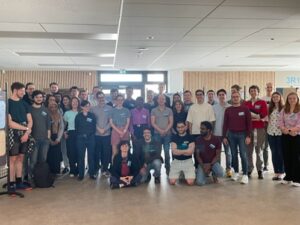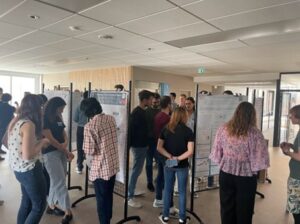27-31 May 2024, Toulouse, France
From the 27th to the 31st of May at the University of Paul Sabatier III in Toulouse, France, the ETSF-YRM workshop was held. In particular the newly built Fermi Building hosted the event in the heart of the university complex. The event gathered 51 people from all over Europe. The event was sponsored by the Psi-K organization, NanoX and the CECAM nodes of Toulouse and Grenoble.
The objective of this meeting is to provide young researchers with the opportunity to share their work and acquaint themselves with state-of-the-art theoretical methods applied both in their own field and in others. Moreover, it offers scientists at the beginning of their careers the chance to network with young colleagues from different institutions, exchange knowledge and ideas and thus integrate further into the scientific community. The event was thought to be welcoming and inclusive, and an enriching experience for young researchers who may not have participated in many conferences before. The aim was also to provide a less intimidating setting than a large-scale international conference. In order to achieve all the above, the organizers provided a friendly and comfortable atmosphere and prioritized the early stage researchers in the oral sessions, helping them develop their presentation skills. The organization committee made sure that all applicants had equal opportunities. The YRM 2024 was divided into five oral sessions. The first session was on advanced electronic structure methods with a particular focus on spectroscopic properties. The second session was on optical properties of materials. The third session was on the vibrational properties of materials. The fourth session was on strongly correlated systems and the fifth session was focused on machine learning in condensed matter. For each session, one or two invited speakers gave an overview of the state-of-the-art in their field and presented their work as well in a keynote talk.
The workshop also organized a poster session and a social dinner for participants to get to know each other and discuss their current research projects.
Detailed program and book of abstracts
Organizers
- Ammar Abdallah (LCPQ, Université Toulouse III )
- Biancorosso Leonardo (University of Trieste)
- Canola Sofia (Institute of Physics of the Czech Academy of Sciences)
- Saravanabavan Karthikeyan (CEA-Liten, University of Grenoble)
Invited speakers
- Castellano Aloïs (University of Liège)
- Filip Maria-Andreea (Max Planck Institute for solid state research)
- Giarrusso Sara (University of Paris-Saclay)
- Janke Svenja M. (University of Warwick)
- Levi Gianluca (University of Iceland)
- Mejuto-Zaera Carlos (International School for Advanced Studies, SISSA)
- Nys Jannes (École Polytechnique Fédérale de Lausanne)
- Schaefer Julia M. (Heliatek GmbH)
- Urquiza Laura (École Polytechnique)
- Vanzan Mirko (University of Milano)
General remarks
Overall, the sessions offered a comprehensive overview of advancements in theoretical spectroscopy. The participants showcased new methodological approaches in materials and molecular sciences, including theoretical models, computational methods, and applications of artificial intelligence, alongside improvements in existing techniques. Additionally, spectroscopic properties such as optical and vibrational characteristics were discussed for novel systems of interest, including solids, molecules, and hybrids.
As experimental research in the field advances and the precision of descriptive models improves, the primary constraint remains computational feasibility. This highlights ongoing questions about how to simulate increasingly complex and large-scale systems for more accurate interpretations of experimental results.
Conclusion and prospects
The workshop was very succesfull and entartaining . All the invited speakers excelled in crafting and presenting their work. The participants responded with great enthusiasm and energy, significantly contributing to the success of this workshop. We gratefully thank Amandine Laurient who works at LCPQ in Toulouse, without her there wouldn’t be any workshop.


